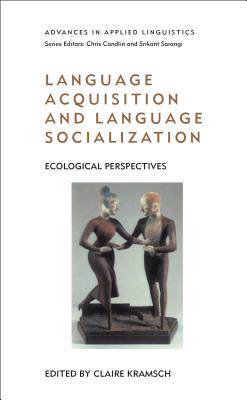
Bedankt voor het vertrouwen het afgelopen jaar! Om jou te bedanken bieden we GRATIS verzending (in België) aan op alles gedurende de hele maand januari.
- Afhalen na 1 uur in een winkel met voorraad
- In januari gratis thuislevering in België
- Ruim aanbod met 7 miljoen producten
Bedankt voor het vertrouwen het afgelopen jaar! Om jou te bedanken bieden we GRATIS verzending (in België) aan op alles gedurende de hele maand januari.
- Afhalen na 1 uur in een winkel met voorraad
- In januari gratis thuislevering in België
- Ruim aanbod met 7 miljoen producten
Zoeken
Language Acquisition and Language Socialization
Ecological Perspectives
€ 415,95
+ 831 punten
Omschrijving
'This is an outstanding collection of papers by top scholars in a range of disciplines who shed stimulating, complementary insights into the social, cognitive and semiotic frameworks that shape both the acquisition of language, and the constitution of social actors through that process. The intentionally loose ecological framing of the volume provides an arena within which a range of perspectives, all united by their opposition to a mechanistic view of language acquisition, can enter into dialogue with each other. This is a most stimulating collection, with a range of insightful investigations of settings as diverse as an autistic child learning to interact with others on the playing field, professional gate-keeping encounters, and foreign language classrooms.'
Professor Charles Goodwin, University of California at Los Angeles
The book brings together well-known scholars in two relatively distinct fields, language acquisition and language socialization, and from a variety of orientations within applied linguistics to describe language development from a relational perspective.
The papers in this volume are a response to three main questions: 1) What conceptual models best capture the ecological nature of language learning? 2) What research approaches are best likely to illuminate the relationship between language and social structure? 3) How is educational success defined for language acquisition and language socialization?
Professor Charles Goodwin, University of California at Los Angeles
The book brings together well-known scholars in two relatively distinct fields, language acquisition and language socialization, and from a variety of orientations within applied linguistics to describe language development from a relational perspective.
The papers in this volume are a response to three main questions: 1) What conceptual models best capture the ecological nature of language learning? 2) What research approaches are best likely to illuminate the relationship between language and social structure? 3) How is educational success defined for language acquisition and language socialization?
Specificaties
Betrokkenen
- Uitgeverij:
Inhoud
- Aantal bladzijden:
- 320
- Taal:
- Engels
- Reeks:
Eigenschappen
- Productcode (EAN):
- 9780826453716
- Verschijningsdatum:
- 31/01/2003
- Uitvoering:
- Hardcover
- Formaat:
- Genaaid
- Afmetingen:
- 158 mm x 241 mm
- Gewicht:
- 607 g

Alleen bij Standaard Boekhandel
+ 831 punten op je klantenkaart van Standaard Boekhandel
Beoordelingen
We publiceren alleen reviews die voldoen aan de voorwaarden voor reviews. Bekijk onze voorwaarden voor reviews.








